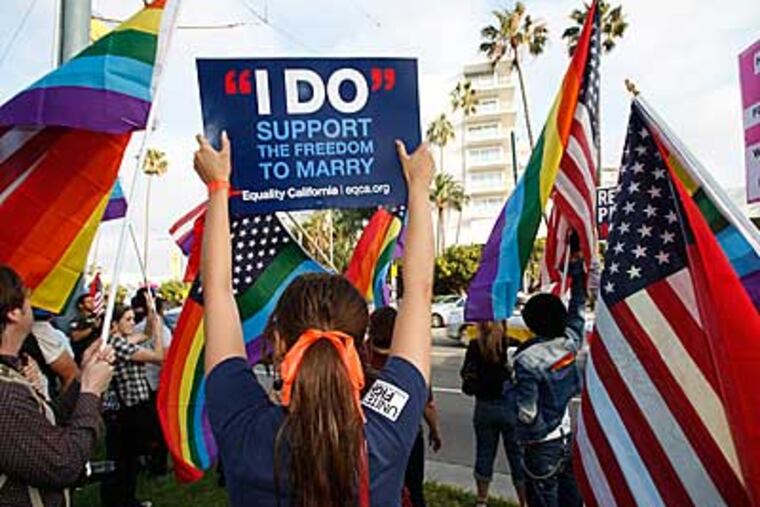Editorial: Troubled unions
Competing proposals in Harrisburg that would legalize same-sex marriage or ban it are being aired in the forum where this evolving issue is best settled - the legislature.

Competing proposals in Harrisburg that would legalize same-sex marriage or ban it are being aired in the forum where this evolving issue is best settled - the legislature.
State Sen. Daylin Leach (D., Montgomery) has drafted legislation that would make Pennsylvania the sixth state to recognize same-sex marriage. (New Jersey approved "civil unions" in 2006.)
It's not clear whether Pennsylvanians are ready to take this dramatic step toward equality. In fact, State Sen. John Eichelberger (R., Blair) has gone the opposite direction and introduced a bill to amend the state constitution to ban same-sex marriage.
Pennsylvania already has the Defense of Marriage Act, which defines marriage as only between one man and one woman. But amending the constitution would prevent the state Supreme Court from knocking out the 1996 law, if it were challenged.
Support for same-sex marriage is significantly higher nationally now than when Gallup first asked about it in a 1996 poll. But its latest survey measured 57 percent opposed to gay marriages.
California's on-again, off-again effort with same-sex marriage also shows that public sentiment is far from settled - and that court rulings are a poor vehicle for establishing such policy.
About 18,000 gay and lesbian couples were married after California's Supreme Court ruled in May 2008 that the state constitution required recognition of same-sex marriage. But in November, a slim majority of voters approved Proposition 8, which amended the state constitution to forbid gay marriage. Supporters of same-sex marriage promptly challenged Prop 8 in court.
Now, the California Supreme Court has upheld the ban on same-sex marriage, in effect saying voters could trump the court. The judges, however, did recognize the legality of the same-sex marriages that took place before the ban went into effect.
That result is extremely unsatisfactory. California's court essentially allowed a narrow majority of voters to rescind a right from a minority. That's a disturbing precedent. It means that if federal law did not protect interracial marriage, a majority of voters in California could simply outlaw it. Under the California ruling, voters there could do whatever they want with the state constitution.
"It places at risk the state constitutional rights of all disfavored minorities," said dissenting Justice Carlos Moreno.
In the past three years, courts in New York, Washington state, and Maryland have ruled that their state constitutions do not grant same-sex couples the right to marry. In each of those cases, the states' highest courts decided that same-sex marriage is a policy matter for the legislative or executive branches.
Of the five states that allow same-sex marriage, only Vermont, Connecticut, and Maine enacted laws recognizing it. In Massachusetts and Iowa, court rulings legalized the practice.
Polls the last four years show more people favor civil unions than gay marriages. But studies of civil unions in New Jersey have shown they are not treated the same as having a marriage certificate.
Finding the best way to provide all the benefits of marriage to gay couples without allowing them to marry remains elusive.